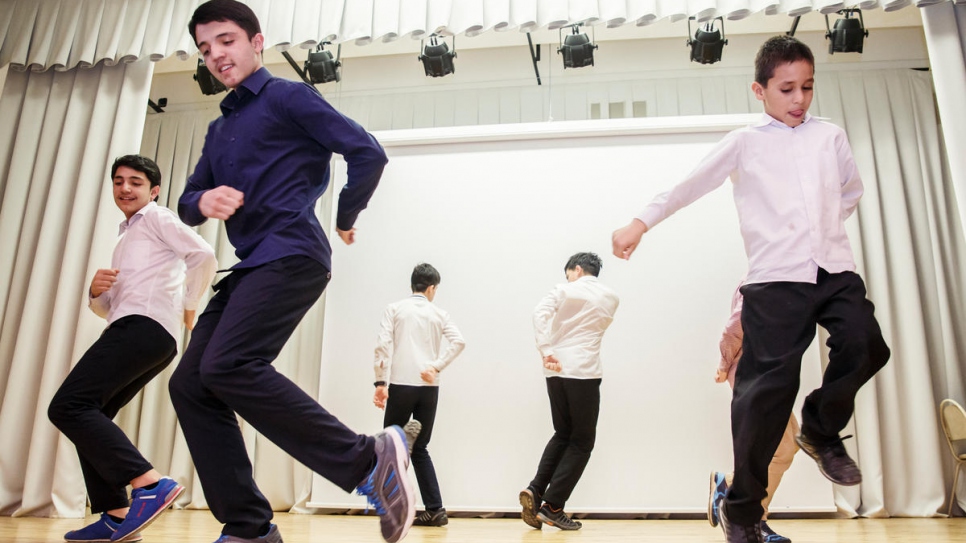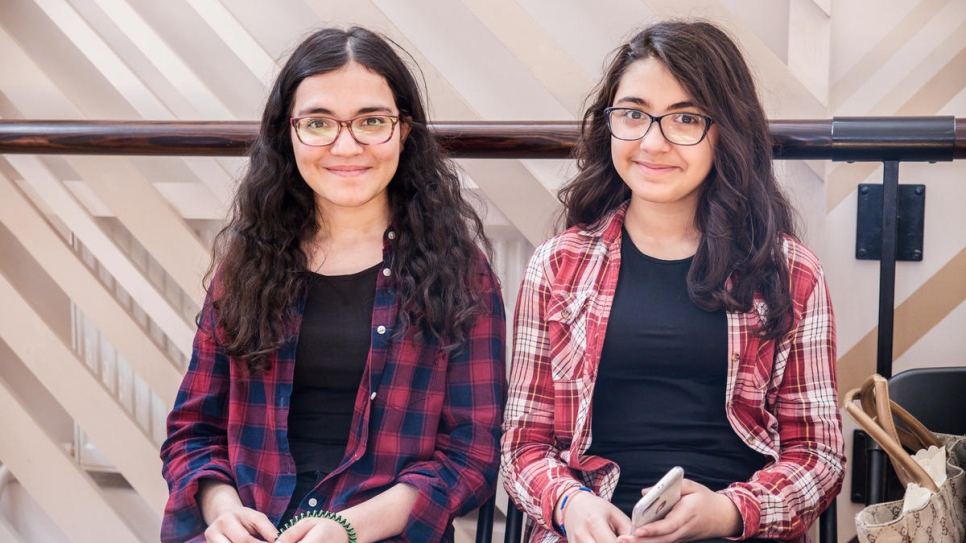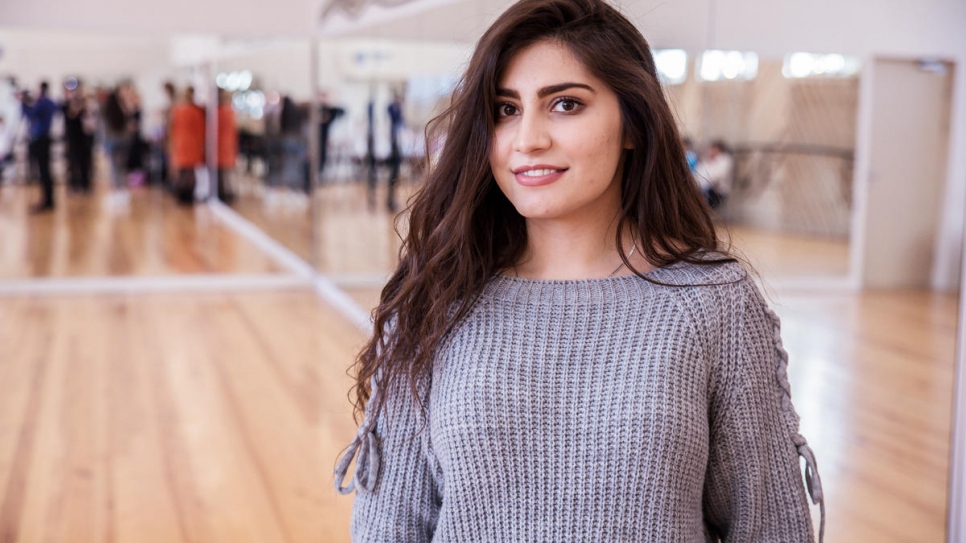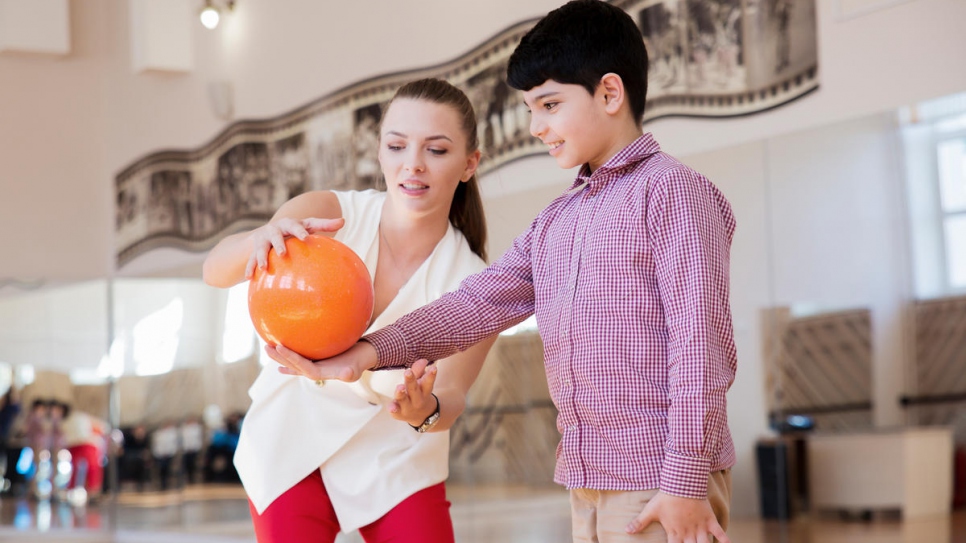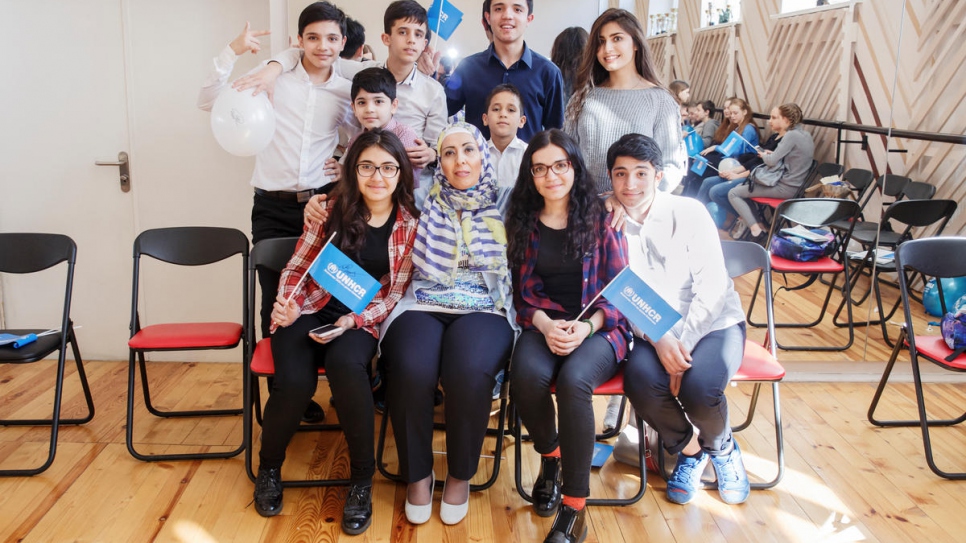Creative arts centre in Belarus builds bridges for refugees
Refugee and local children mingle at a UNHCR-funded project where they can take part in activities from kickboxing to ballet.
Rosana, from Afghanistan, learns how to use a gymnastics ribbon at Evrika community center in Minsk.
© UNHCR/Egor Dubrovsky
Svetlana clasps her hands together nervously and motions to a colleague to start the music. “Remember,” she calls to the six Afghan boys on stage. “Maintain your distance!”
The traditional Afghan dance the youngsters are practising is one of Svetlana’s proudest achievements. She taught herself 18 years ago by studying videos. Now, she is passing on her knowledge and passion to children at this community centre in Minsk, Belarus, where she teaches dance.
Evrika (‘Eureka’) offers after-school activities to about 7,000 children in Minsk, from kickboxing to ballet, sewing to ceramics. Thanks to a partnership with UNHCR, the UN Refugee Agency, refugee and asylum-seeking children can attend for free, improving their language skills, integrating into the community and meeting new friends.
“The most precious thing is communication."
Four of the boys dancing on stage are brothers who fled conflict and persecution with their family in 2016.
“On that first day, when they came home after a dance class, I asked them, ‘How was it?’” recalls their father, Farman. “They were so happy.”
“The most precious thing is communication,” Svetlana says later, as refugees and Belarusian children meet for a singing class. “You probably don’t see it, but they are communicating. The children exchange cultural experiences and they don’t care who is a refugee. We call them Evrikans.”
For decades, Belarus has welcomed hundreds of people from Georgia, Syria, Afghanistan and beyond. Currently around 2,200 people who fled war, conflict and persecution call Belarus their new home after being granted asylum. There are also some 6,000 stateless people living in the country.
Through partners such as the Refugee Counselling Service (RCS) and the Belarusian Red Cross, UNHCR offers them education and legal support.
Irina, a mother of three from Minsk, is waiting in the corridor for her six-year-old daughter Amelia to finish the singing class.
“It’s important that the children are together,” she says. “That they live, speak and think together. I want that my daughter is friendly and doesn’t think about people being from other places. Evrika is a place without borders.”
Singing with Amelia and other Belarusian children today are 18-year-old Saima from Afghanistan and her friend, 13-year-old Nazgol from Iran. When they first met nine months ago they struggled even to communicate with each other. Now, they are best of friends and nearly fluent in Russian.
“At the beginning we couldn’t understand each other,” says Saima, smiling. “But we learned here how to speak together.”
Nazgol adds: “Tolerance is important because if there is no tolerance there will be more wars around the world.” With the help of classes at Evrika, she is achieving her dream of becoming an actress.
Evrika also works to reduce the sense of isolation that refugees and asylum-seekers can feel. Every Saturday, former refugee Nahid, now a Belarusian citizen, teaches Dari and the history of Afghanistan to 35 young students, ensuring they are able to integrate without losing their own sense of identity.
“School is tough in Afghanistan, the teachers are very strict,” says Nahid. “Here, we’re just like friends. The children feel very comfortable at Evrika, I see it in their eyes. This is a house of happiness.”
"This is a house of happiness.”
Angiza, a university student originally from Afghanistan, remembers how transformative Nahid’s classes were. “The way she teaches makes you remember,” she says.
“If you didn’t do your assignment, next time you’d get two. Now there are people who ask me to teach them Dari. I’m very thankful.”
The Evrika centre is unique in Belarus, says Jean-Yves Bouchardy, UNHCR representative in the country.
“The project is an encouraging example of building on the capacity of a pre-existing public facility to enhance the integration of refugee children," he adds.
Angiza hopes Evrika will continue to open its doors to children. Recently married, she plans to bring her own children one day.
“I came here when I was small because it’s a shame when children forget their own language,” she says. “Now every Saturday I come back because of the sense of the community. My childhood is somewhere in these walls.”

